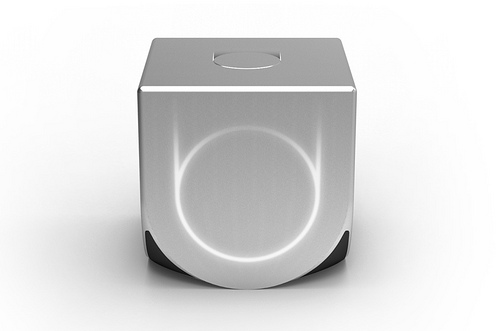By Joel Smart (The Cascade) – Email
Print Edition: July 18, 2012
It’s called the Ouya. It runs on an open-source Android mobile operating system. Every game it offers will be free-to-try, with most offering full versions at a cost. It’s hackable, without voiding the warranty, and anyone can use it to make their own games. It’s also cheap, to be released next March for just $99 (with a controller included). This is a home console that almost anyone can afford, and it’s tailor-made for creative, genre-busting indie games.
Indie developers have to jump through a lot of hoops to get their games on a home console system currently. Sony, Microsoft and Nintendo have had a stranglehold on the industry since many gamers were first introduced to the medium. They are the big three, and if you want to make a game people play on a TV, you go through them; you play by their rules. However, the Ouya will change all of that. Suddenly, anyone can make games that anyone can play. That could really change the face of gaming.
What really gives the Ouya promise is the support it has already received. The Ouya project was announced on Kickstarter, an online funding website where the public donates money to creative projects they want to support. Their request: $950,000. It reached that goal in an astounding eight hours, hitting over $4 million in 48 hours. With the project still receiving donations until August 9, it’s anyone’s guess how much the final tally will be. It’s the kind of support that gets attention from major developers, and sure enough, many established game makers have already announced plans to work on the Ouya.
The mastermind behind the new console is game industry veteran Julie Uhrman, finally fed up with the current state of the industry. She has worked at game design studio Vivendi Universal as well as gaming media IGN and game service GameFly. She’s also working with the award-winning designer of the One Laptop per Child computer, Yves Behar. He’s responsible for many other products, like the successful portable Bluetooth speaker known as the Jambox. He and his design and branding firm Fuseproject are hugely involved in bringing the Ouya to market.
Granted, the console won’t be able to compete with the specs of next-generation consoles. However, it should be powerful enough for the types of games most indie developers can afford to make. It’s set to run on a Nvidia system on a chip (SOC) called the Tegra 3, designed for high-tech tablets. It will have Bluetooth and Wi-Fi, as well as eight gigs of internal flash memory and one gig of RAM. Uhrman claims in her Kickstarter pitch that the end result should be easy to develop games for.
While most are showing enthusiasm towards the crowd-funded Ouya project, Craig Rothwell is very concerned. Rothwell was the creator of the Pandora Handheld, a mobile gaming device that you’ve likely never heard of. First announced in 2006, the Pandora suffered numerous setbacks along the way as it aimed to compete with Nintendo and PlayStation in the turbulent handheld gaming market. In an interview with Pocket Gamer, Rothwell claimed that it was either price or quality – you can’t have both.
“You simply cannot make a quality console and controller for $99, no matter how low you go in China…” he said. “When trying to come to market with a rock bottom price, one error, one contractor messing up, and it’s curtains.” He acknowledged the support the project has right now, but getting the project to market could be tricky. “When all the hype dies down, this machine could well be DOA [dead on arrival], and Ouya could be looking at a giant black hole of losses.”
It’s impossible to know right now how things will go for the Ouya, but if it manages to make it to market at the proposed $99 price point, it promises to fill a market that has been stifled by the big three for far too long. If it happens, it will surely spawn some of the most creative games around. That’s the kind of shakeup the industry sorely needs.


